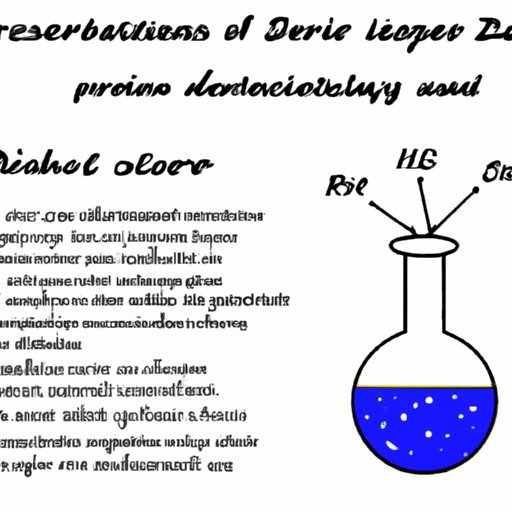Introduction
Science is a powerful tool for understanding the world around us. It is a process of systematic inquiry that uses evidence-based methods to answer questions and make discoveries. Through rigorous experimentation and analysis, scientists are able to uncover the mysteries of the natural world and develop solutions to complex problems.
In this article, we will explore what science teaches us. We will look at why scientific inquiry is important, how it improves our understanding of the world, and examine the impact of science on society and our everyday lives.
The Value of Scientific Inquiry
The importance of scientific inquiry cannot be overstated. From the invention of the wheel to the discovery of penicillin, science has shaped our understanding of the world and enabled us to make remarkable advances in technology, medicine, and other fields.
As physicist and Nobel laureate Richard Feynman famously said, “the first principle is that you must not fool yourself — and you are the easiest person to fool.” This emphasizes the importance of using scientific methods to ensure accuracy and avoid bias in our work.
Scientific inquiry helps us to identify and test hypotheses, gather data, analyze results, and draw conclusions. By using evidence-based methods, scientists can gain a better understanding of the world around us and make discoveries that could have a profound impact on society.
How Science Improves Our Understanding of the World
Scientific research involves a systematic process of inquiry that relies on evidence-based methods to answer questions and make discoveries. Scientists use a variety of techniques to collect data and analyze results. These include observation, experimentation, and mathematical and statistical modeling.
For example, studies have shown that climate change is caused by human activities such as burning fossil fuels and deforestation. By analyzing data from satellites and other sources, scientists have been able to determine the extent to which human activities are contributing to global warming.
Through careful analysis and experimentation, scientists have also been able to uncover the secrets of the atom and unravel the mysteries of DNA. By studying the structure and function of cells, researchers have gained insight into how diseases such as cancer and Alzheimer’s develop and spread.

The Benefits of Experimental Research
Experimental research is an essential part of scientific inquiry. Experiments allow scientists to test hypotheses and collect data that can be used to answer questions and make discoveries. Experiments can also be used to compare different treatments or techniques to determine which is most effective.
For example, experiments conducted by researchers at Stanford University showed that a drug called Bromhexine was more effective than placebo at treating chronic obstructive pulmonary disease (COPD). This finding has led to the development of new treatments for COPD and has improved the quality of life for millions of people.
Similarly, experiments conducted by researchers at Harvard University showed that a low-fat diet was more effective than a low-carbohydrate diet for weight loss. This finding has revolutionized the way we think about dieting and has had a major impact on public health.
How Science is Used to Solve Problems
Science is an essential tool for solving problems. By using scientific methods to study the natural world, scientists are able to uncover the causes of problems and develop solutions that can improve our lives.
For instance, research conducted by scientists at the University of California, Berkeley showed that air pollution is linked to increased rates of asthma and other respiratory illnesses. This research has led to the development of policies to reduce emissions and improve air quality in cities around the world.
Similarly, research conducted by scientists at the Massachusetts Institute of Technology showed that increasing access to clean water can reduce the spread of waterborne illnesses. This research has helped to inform policies aimed at improving access to clean water in developing countries.

Exploring the Impact of Science on Society
The impact of science on society is both positive and negative. On the one hand, advances in science and technology have enabled us to make remarkable progress in areas such as medicine, agriculture, and transportation. On the other hand, there have also been some unintended consequences, such as environmental degradation and the proliferation of weapons of mass destruction.
For example, the invention of the automobile has had a dramatic effect on our lives, making it easier to travel long distances and providing us with greater freedom. But this has also led to increased levels of air pollution and traffic congestion.
Likewise, advances in medical science have led to longer life expectancies and improved healthcare. However, these benefits have come at a cost: the overuse of antibiotics has led to the emergence of antibiotic-resistant bacteria, and the use of synthetic chemicals has had a detrimental effect on the environment.

The Power of Science in Everyday Life
Science has a profound effect on our everyday lives. From the food we eat to the clothes we wear, science has improved the quality of our lives in countless ways.
For instance, advances in agricultural science have enabled us to produce more food with less land and fewer resources. This has helped to reduce hunger and poverty around the world.
Similarly, advances in medical science have enabled us to treat and even cure many diseases. Vaccines have eradicated many deadly illnesses, and new treatments have greatly improved the quality of life for those suffering from chronic conditions.
Conclusion
In conclusion, science has had a tremendous impact on our understanding of the world, our ability to solve problems, and our everyday lives. Through careful experimentation and analysis, scientists have made remarkable advances in areas such as medicine, agriculture, and technology.
It is clear that the value of scientific inquiry is immense, and its potential to improve our lives is limitless. We must continue to support scientific research and exploration if we are to make further progress in understanding the world around us and finding solutions to the problems we face.
(Note: Is this article not meeting your expectations? Do you have knowledge or insights to share? Unlock new opportunities and expand your reach by joining our authors team. Click Registration to join us and share your expertise with our readers.)
